| |
'I never had enough money to make any of my films. I just had to use my wits. I came on the set and I was expected to have "instant genius." Over the years of battling against all odds I learned what I could get away with.' |
| |
Director, Val Guest |
When your CV contains such a diverse and eclectic array of work that includes The Quatermass Xperiment (sic), Casino Royale (the 60s spoof) and Confessions of a Window Cleaner, no one can accuse you of pretention. But Val Guest directed some marvelous movies and one of his favourites - and without question my favourite of his oeuvre - is The Day The Earth Caught Fire. The rigorous, integrity-loaded tone of the movie is absolutely spot on. There is a potent and dynamic realism to this film that seems almost documentary-like. It never loses its way despite playing a credible, real end of the world scenario via the portrayal of a journo down on his luck, his broad attempts at seduction and the 60s newspaper milieu which may not be believable to real journalists but smacks of reality to us punters. Remember that fine cliché… Truth is good, reality is better but believability is king. Yes, there is the case of the science correspondent who was asked to give the script the once over came up with a comment very much like "Riveting read but utter balls…" referring to the event that triggers the massive global climate shifts. But since when did science fiction have to be science fact, an issue plaguing the makers of Interstellar right now (another film featuring Michael Caine). The Day The Earth Caught Fire was Caine's debut on screen and a very credible 'policeman giving directions' performance he delivers. From a small part to the big issue; the fact that mankind in its nuclear arrogance, has gone and been a tad foolish, and created a situation which threatens to burn off every soul from the planet.
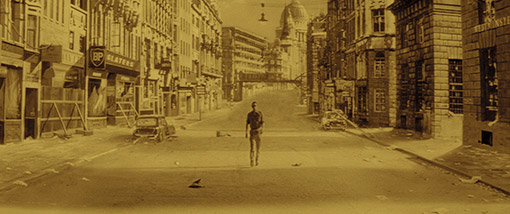
It's London in 1961. A man walks down a deserted, paper strewn Fleet Street (for our non UK readers, this is where the nucleus of the UK's newspapers used to be situated before Murdoch went digital). The black and white image has been tinted yellow to suggest heat. The man is sodden with sweat. He enters his workplace to type his last story (or will it be his last?) The type roller has disintegrated in the heat. He phones the story in… His words have an apocalyptic air and the stakes are as high as they have ever been at any other time in human history. As we track back, there's an inexplicable dissolve in the middle of the camera movement, something that is rightly questioned on the commentary. And then after the soft cut, we do the memory wobble effect over the teleprinters… Black and white returns and we are thrown back in time, three months earlier, a few days after dual nuclear detonations by the super powers exploded at opposite poles of the planet. For the newspaper, the Daily Express, this is a story like any other and veteran reporter and science specialist, Bill Maguire (a young, vibrant Leo McKern) needs back up information. His colleague and friend (the sweaty man from the prologue) Peter Stenning (Edward Judd) is late for work. He's also a divorced alcoholic, facts cleverly established in minutes. He also has a past wreathed in journalistic glory and now just dogsbodies for his senior partner. Alcohol has that effect on professional performance. He meets and falls for a Temp, Jeannie, to whom he was initially rude. As their relationship navigates through a few rocky stages, Stenning appears to be more frustrated at work and with his annoyingly infrequent occasions he gets to spend time as a father to his young son. Strange weather starts to manifest itself as we learn that not only have the bombs shifted the axis of the Earth but the planet's orbit has been fatally compromised…
Taken at face value, this is a film about a potential global disaster resolutely set in London (a main player of the piece as much as any actor's character) and filtered through the microcosm of the English press. It seems that in 1961, newsmen and women were not hacking murder victim's phones or making up spin-soaked PR claptrap that gave validation to Mark Twain's famous quote; "If you don't read the newspaper, you're uninformed. If you do read the newspaper, you're misinformed." This is a world-weary, wry, witty and cynical bunch but a fair minded one trying to do its best to serve the public via newspaper stories. That fact that the once crusading newspaper (apparently 'crusading' can mean 'causing change in a social, political and religious context), the Daily Express, allowed its brand to be portrayed onscreen is notable and the presence of its ex-editor, Arthur Christiansen, actually playing the fictional editor of the Express, Jeff Jefferson, is even more of an official stamp of approval. As we are often reminded, Christiansen was a legend at the time. And in that time, fifty-three years ago, the Daily Express had a reputation. Without elaboration, that single word 'reputation' tends to indicate a positive and ethically worthy standing. Times (and even The Times) change.
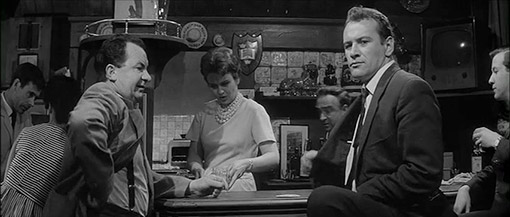
Judd, for some reason, never carved out a significant career after this movie, one that officially 'introduced' him. It's a small slap in the face (though well intentioned, I accept) to have included on this disc the work that Judd did that is well known by people of my generation – of all things, his motorcycle safety advert in 1978. "Think bike!" His character's obdurate nature, his swagger, his cynicism and all round 'been hurt and is now a defensive ass with a class chip on his shoulder' is perfectly established and, oddly, compellingly memorable. I even remember the physicality of his walk in the opening scene of the movie. Some have been less than charitable about Judd's performance. I, for one, champion it. How many actors can be front and centre in a story about global annihilation and still register so strongly? It's not as if everyone was transfixed by the special effects - more on those later. Director Val Guest may have had a few moments of trouble with the actor but Judd's performance makes up for any on set niggles. He is at the centre of a film with bigger issues to play out. Despite the 'all or nothing' science fiction premise, we accompany Judd on a romantic narrative. I've not seen too many movies with a huge, almost unwieldy premise, brought to life with a parallel story of boy meets girl. Judd starts the film as a gin soaked journo caring only about his estranged son (being brought up as a 'toff' with his ex-wife's new husband). Through the love of a great woman (let's leave 'good' in the dust, shall we?), he redeems himself.
The great woman is Jeannie Craig (Janet Monroe). Cast as the wholesome girl in three Disney pictures (with breast flattening tape put in place each filming day), Monroe was anxious to break out of safe roles and encouraged director Guest to help her 'grow up' on screen. Artfully placed towels help obscure grown up parts (so to speak) but the production stills illustrate what may have been a racier aspect to her role. If you are so driven, a breast can be seen for the briefest of flashes reflected in a mirror. All this X certificate stuff does not obscure her part in one of the most convincing and realistic romantic relationships on screen. Yes, it's accordioned to a vast degree and there are cinematic short cuts taken but what starts as a crude seduction turns into something much more durable, honest and dare I say 'grown up' (the irony of potentially having only months to live pulses neon-like in the background). There is nothing like imminent doom to act as a catalyst to a union. Love now. We may not have a tomorrow. Munro is superb enlivened by a sharp, fast and realistic script that bagged Guest a BAFTA. In fact, every aspect of the film hangs on how good the script is. I'm not talking only about the rapid fire, overlapping dialogue (which sometimes reminds me of the superb 30s screwball comedies, His Girl Friday in particular and is it a coincidence both movies are about the press? It is a coincidence that John Oliver mentions this in his essay in the booklet. I read that after I came up with the comparison and yes, you'll just have to trust me on that). I'm also talking about structure and how the metaphorical 'bomb' is dropped after a phone call from Russia. Over the running time and despite dodgy library footage, weird squashed trees, obvious model work and all aspects that make this cheap but astoundingly well-directed work falter, it never does. There's not a dud scene in the whole picture and you have to credit the script first. It wasn't all Guest's work. The script is credited to both Guest and Wolf Mankowitz, the famous playwright of the 50s and 60s.
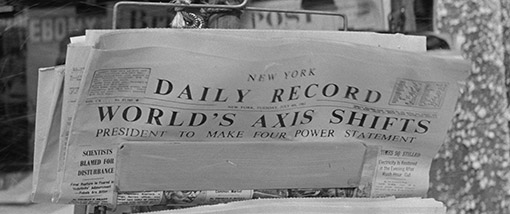
It falls to non-actor Arthur Christiansen to deliver the devastating news which drives the third act and yes, he is one-note for a lot of the time but his was a memorable performance and as much part of the fabric of the piece as any other actor's contribution. The irony is that his unease on camera gives him character. The cast is littered with famous faces from UK society at the time. Bernard Braden, a Canadian comedian and UK TV and radio star, plays a sub-editor and there's also 'Sir!' from The Good Life (Reginald Marsh) and C.J. from the TV series The Rise and Fall of Reginald Perrin (John Barron) in minor roles. He didn't get where he is today by playing minor roles in superb movies… But the acting chops, if any award needed to be given, have to go to the great Leo McKern. A review of the movie at the time remarked that he gave the impression he'd been working at a newspaper for 25 years. He is a small, stout man but has a nimble energy that belies his shape. He simply walks off with the movie. Whenever he's on screen, the other actors have to work hard to pull attention off McKern but in that environment (the newsroom with overlapping dialogue) everything and everyone works so beautifully and McKern does get most of the best lines.
As far as the other film disciplines are concerned, two stand out for comment. There is no music except source music (being played by the actors or played from radios etc.) To Guest, the movie was 'real' and newsreels didn't have music (that's not quite true though, is it?) But it works gangbusters. The whole piece, a few dodgy moments notwithstanding, would quietly find a place to lie down and die if a bespoke score was introduced. The movie stands and falls on its ability to convince – and it does so. You can't make a film about the end of the world without suggesting some fairly dramatic action. Guest uses several techniques. The first (and how smart is this?) is library or stock footage of real events; droughts, forest fires, rioting. He then gets the art department to build a realistic portion of the scenes he has in the library, re-enacts a smaller part of it and ends on a newspaper made up to tell the headlines of his story. Of course, the only problem is that the stock footage has much more grain than his bespoke shots but it's still a smart way of doing things on the cheap. For a few stock shots of a forest, Guest obviously felt to decrease the grain, he would anamorphically stretch the near square framed shots to the cinemascope frame. What do you get? Fat trees.

The second way to pull off effects on a small budget is to hire a man called Les Bowie. Bowie was the practical effects man, a legend of his era. He worked with David Lean, Michael Powell and at the age of 65 in 1978, he picked up an Oscar for his work on Superman. Bowie's specialty was matte paintings and Val Guest claimed he could knock one off in a couple of hours. To those of you not as excited by special effects as I am, matte paintings aim to be photorealistic vistas which sit in front of any live action sometimes on a glass plate and can be taken by a trompe l'oeil as the receding horizon. His matte work on such a low budget is pretty astounding – a dried up Thames, a deserted Piccadilly Circus. Some mattes were complimented by photographs but the bulk of his matte work is fairly amazing. Where things literally fall down are seeing model buses not shot at exactly the right frame rate (and so appear too small as they overturn) and one ludicrous shot I would have jettisoned of a pair of canal barges being buffeted by angry water. Practical FX rule no. 1: you cannot shrink water so no matter how skillfully you shoot it, the model has to interact with huge blobs of small water. The canal boat models were so clearly cheap but as I mentioned earlier, these aspects didn't hole the whole metaphorical boat at all. And some of the effects are so cheesy as to be close to mouldy but again, the movie is strong enough to shrug off these concerns.
Finally I bet you're asking yourself why I haven't mentioned global warming… Well, I just did and Guest could have no more anticipated it than he could have won the lottery. He was ensconced in the nuclear age, one that produced very real public fears in the late 40s to the 60s. It was this fear that inspired the writing of the brilliant but criminally under appreciated The Day The Earth Caught Fire.
The BFI 4K transfer rendered here in 1080p HD looks just gorgeous. There is a minimum of damage, precious few dust spots or negative sparkle and the contrast ratio is pleasingly stark. The detail in the newsroom entices you to move closer to the TV. The top and tail scenes' tinting, despite being a bit on the nose, is never distracting. It's not as if some broad colour tint in black and white stock was anything like a surprise. 1961… Not a year well before the invention of colour stock. To Guest, black and white meant 'realism'.
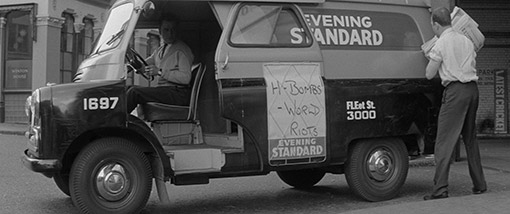
The Linear PCM mono soundtrack is perfectly understandable for a film of this vintage and I detected precious little hiss at all. Of course, it's not a surround mix but the sound was well up to modern standards in terms of clarity and range. In fact after Interstellar, some might say it's better than over-produced modern soundtracks. In the Set Up option on the main page, there is only one option – subtitles on or off. A silly little detail but fun… You know how Blu-ray main menus have the capacity of driving you round the bend with the endless loop of whatever sound or piece of music that's been placed there? Well, for The Day The Earth Caught Fire, the sound is an Alan Splet – David Lynchian industrial hum and apart from it being a great ambient sound, it's also soothing rather than terribly annoying. Oh and the 'X' certificate at the front of the main feature… What memories those certificates bring back.
Hot (geddit, 'hot'?) Off the Press: Revisiting The Day the Earth Caught Fire
(John Kelly, 2014) (33' 20")
A newly-created documentary with contributions from Kim Newman, Marcus Hearn and BFI Archive curators John Oliver and Jo Botting
This is a solid entry in the movie's (up until now 'under') appreciation. Nice to see Kim Newman carving out an 'Extra Features' persona (see The Wicker Man's Extras). The man knows his stuff. It's also really enlightening to see some of the mechanics necessary to rescue these fragile prints. I'm a big fan of celluloid and it still astonishes me how much detail could be captured on conventional film. In fact I'd like to see a full documentary on the restoration process itself.
Audio commentary with Val Guest and Ted Newsom
This is a port from the Anchor Bay 2001 DVD release and it's still great value. Ted Newsom makes a good interviewer and Guest a knowledgeable and interesting raconteur. There are a few odd things in it. Both men spend a great deal of time discussing the most fleeting of mirrored appearances of Janet Munro's right breast. Yes, it's in the context of censorship and how it works differently in the UK than in the US but it did feel a tiny bit salacious. This is confirmed to me when Judd rescues Monroe and as she gets out of the bath, she turns her back. Newsom says "And that is as naked as she's going to get," with a faint whiff of disappointment. Newson often asks Guest to explain certain terms, terms that anyone from the UK would know so it's obvious that this is an American effort (and bravo for making it, Anchor Bay).
On a few occasions Guest insists that certain scenes were shot on location but outside Battersea Park, it's very obvious that it's a set. There are small giveaway black lines around some of the extras as they wait in a water line, the give away for a process shot (a shot with the background added optically later). There's an interesting comparison between Earth and Citizen Kane of all movies. Both feature overlapping dialogue and two versions of front-page headlines waiting for the truth… The level of detail taken over the sets is discussed and there was one fact I pounced on with glee. It's the sort of detail that adds tremendous realism although in this case it was probably never picked up by the camera. When journalists place their pencils down, it's always with the nib facing towards them because it's natural to pick it up without contorting your hand to have it ready for action.
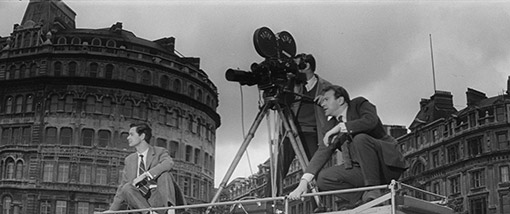
Apparently Leo McKern could read his lines in the make up chair of the day's filming and be word perfect in his and his co-players' parts. That's a gift. And something other actors hated him for (though I'm sure, politely). Finally, American interviewer Ted Newsom asks a lot of questions about the water tanks attached to the cars in the final days of the climactic countdown. He says, I'm assuming, ironically that if the US ever ran out of water… "…we'd steal it off someone else!"
It's a good, solid commentary with a few eyebrow raises and despite the inevitable repetition, it's a damn fine way for a fan of the movie to spent an hour and forty minutes.
An Interview with Leo McKern (Paul Vanezis, 2001) (8' 56")
Not looking in the best of health, one of Outsider's favourite actors leans on the bar of a Fleet Street pub and recounts his memories (both discrete and indiscrete) of his five-weeks on The Day The Earth Caught Fire. It's an entertaining romp through a professional actor's memory and there doesn't seem to be too much wrong with his version of events as backed up by others talking about the actual experience of shooting it..
The Day the Earth Caught Fire: An Audio Appreciation by Graeme Hobbs (2014) (8' 45")
A good, short review making a few points not covered by the main documentary and that is always a plus. There are only a core number of facts trotted out about any subject, any movie, any movie star and they tend to be repeated ad infinitum so when we get new facts usually presented from that reviewer's perspective, it's usually much more fun.
Original trailer (2' 38")
With the expertly re-voicing of the original 'bastards' as 'bunglers' (a censored word seen all through the extra features), this is a solid trailer of its time with no real surprises and the hyperbole is kept fairly low key.
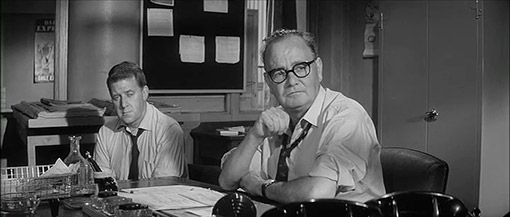
TV spots (1' 00", 23", 10", 22")
"The most provocative film in years!" and then a proclamation of the title as recorded in an echo chamber. For some reason it reminded me of the Muppet's announcements of "Pigs In Space!" Some of the spots are tinted and some have editorial slip ups (there's a frame or two of the next shot at an edit which clearly doesn't belong there). I don't think of TV advertising in 1961. How many people in the UK had TVs in 1961? Come to think of it, my less than well off family probably had one as there's a very sweet picture of myself next to what may have been a state of the art TV at the time. And it's the size of a fridge with a viewing area of smaller than an A4 page…
Radio spots (1' 00", 30", 30", 20")
"See The Day The Earth Caught Fire!" "What would you do if you only had four months to live?" What indeed? It's genuinely twee, but curiously effective radio ads for the movie. "Pigs In Spaaaaace!"
Stills and Collections Gallery
The usual suspects, many we've seen littered throughout the other extras. There are first and final draft script pages, the differences between each I find fascinating but appreciate that this isn't everyone's hip flask of spirits. The key image a lot of the promotional material is centred on reminds me of Hitchcock's promotion of The Birds. The person on the poster of the avian thriller is in fact Jessica Tandy, (the actress playing the male lead's mother) not the star Tippi Hedren. The moment captured and exploited in the promotional material of The Day The Earth Caught Fire is the one when Edward Judd goes to rescue Janet Munro from a water-happy marauding mob. A female reveller jumps into his arms. In the still, it looks like he's rescuing an intimate friend as he's in full run mode. Despite this collection including a racy photo shoot of Janet Munro with a famous pornography photographer, (all very chaste) there are two official production stills of her topless leaning over a basin washing her hair… As there is no direct nudity in the movie, these come as a bit of a shock (the two pictures not the two body parts). But the three frames or so of reflection and the hints of the side of a breast in the actual film earned it an 'X' certificate. In the UK, that meant no 16 year olds allowed. In the US, 'X' usually meant hard-core pornography.
Three nuclear films from the BFI National Archive:
Operation Hurricane (Ronald Stark, 1952) (33' 03")
A real trio of curios – nuclear films! This first one is supposedly all about science and the furtherance of our knowledge of the effects of a nuclear blast. It's half an hour of tease and a whopping cloud of climax. It's ironic that after all that waiting, we miss the first part of the blast – might I suggest overexposure?
The H-bomb (David Villiers, 1956) (21' 14")
Did you know that a nominal atom bomb unleashes the same destruction as 20,000 tons of TNT? And that an H-bomb trumps that by a factor of 500… Imagine that… 10 million tons of TNT. Even the makers of Where Eagles Dare couldn't get through that lot. The numbers are staggering as was the decision to lay waste to Nagasaki and Hiroshima. This is the film to see to understand the explosive and horrific effects of these devices.
The Hole in the Ground (David Cobham, 1962) (29' 45")
Also Sprach Zarathustra! Seven years before Kubrick! I'll lay bets Kubrick had seen this – he made his own nuclear movie two years after this one was made after all. And Kubrick was all about research. This is an information film in colour about the services of the Warning and Monitoring Organisation. These films prove how real the nuclear threat actually was for the UK. I recognise an actor and suspect there are a few playing the real people running the organisation. It's all boffins and pipes, all very reassuring despite its subject matter.
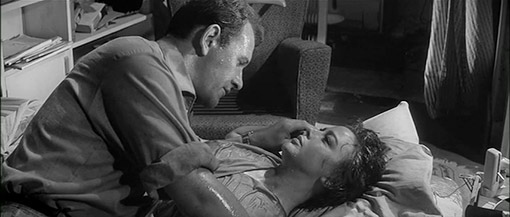
Think Bike: road safety film with actor Edward Judd (1978) (1' 02")
Isn't the human mind extraordinary? I remember this with a clarity that frankly astonishes me, even him pulling his sleeves up. And the shot of the obvious dummy being hurled off its bike is also seared in my memory. Isn't it weird, the stuff that sticks? So this was Judd's post-Earth career highlight? No, it wasn't but it's probably in the Extras because it's so well loved and remembered.
Illustrated booklet with extensive credits and newly commissioned essays from John Oliver and Marcus Hearn
This is solid work from the contributors. Curator of the BFI National Archive, John Oliver has written a good piece putting the movie in context and reminds us of the main information (some repetition obviously). Film and TV historian, Marcus Hearn takes us through the tortuous years one might call pre-production and Guest's travails making it. He also reminds us that his biggest hit was (you've guessed it?) Confessions of a Window Cleaner. Sigh. The John Gillet Monthly Film Bulletin review of Earth is dismissive, terse and superior. Not much change there. I do like the BFI's decision to include it though. They do have to stand by their Bulletin reviews even if they are tempted in Sight and Sound to be selective in their extracting (see Slarek's take on Blade Runner, here). An in all, it's a slim but good accompaniment to the disc.
Blu-ray Exclusive Feature:
The Guardian Lecture: Val Guest and his wife, actress Yolande Dolan are interviewed by David Meeker, filmed at the National Film Theatre (1998) (1 hour, 02' 20")
This is a loving trawl through Val Guest's career with his wife in attendance. Ms. Dolan is about as Luvvie as it's possible to be without exploding with 'darlings' and plays to the crowd shamelessly. That cravat on Guest plants him in an era that has long gone. But some of the stories are priceless. Hitchcock in the next cutting room playing practical jokes on Guest and how Guest gets his own back. Jean Simmons became huge in the US after starring with Val Guest as a teenage lead in Give Us The Moon. She vowed she would always cut her fee to work with him again and she kept her word. I find it very satisfying hearing stories of people being decent to each other. In many ways, our word is the most valuable thing we have to give away. Earth obviously gets a mention but it's a small part of a career wide interview with a lot of Will Hay fans in the audience asking questions.
The Day The Earth Caught Fire is a cracking film, directed with real verve and flair and written superbly well, realistic and yet dramatic while eschewing any sense of melodrama. With an adult relationship at its core and the background of a bustling newspaper on the story of all their lives, The Day The Earth Caught Fire is the best British science fiction film out there and the BFI have done it proud. Heartily recommended.
Note that due to the enhanced copy protection on the disc we were unable to get our usual screen grabs. Most of the images above were supplied by the BFI and are actual screen grabs from the new Blu-ray release, but pictures 2,7 and 8 have been taken from the 2009 DVD release from Network Distributing have have been included for illustrative purposes only.
|